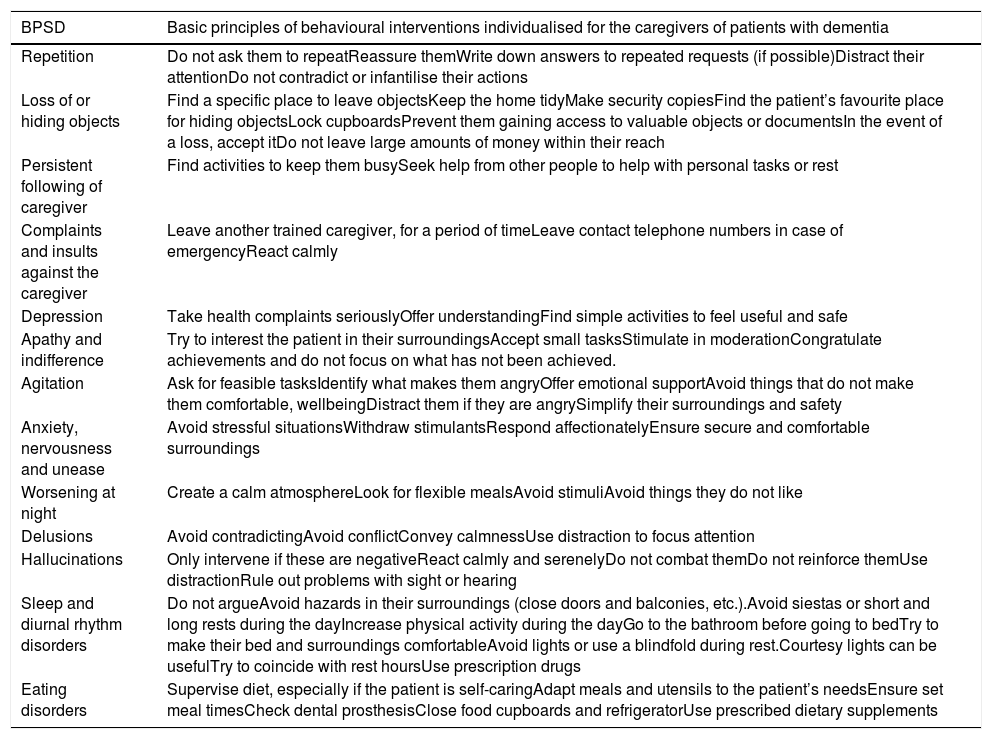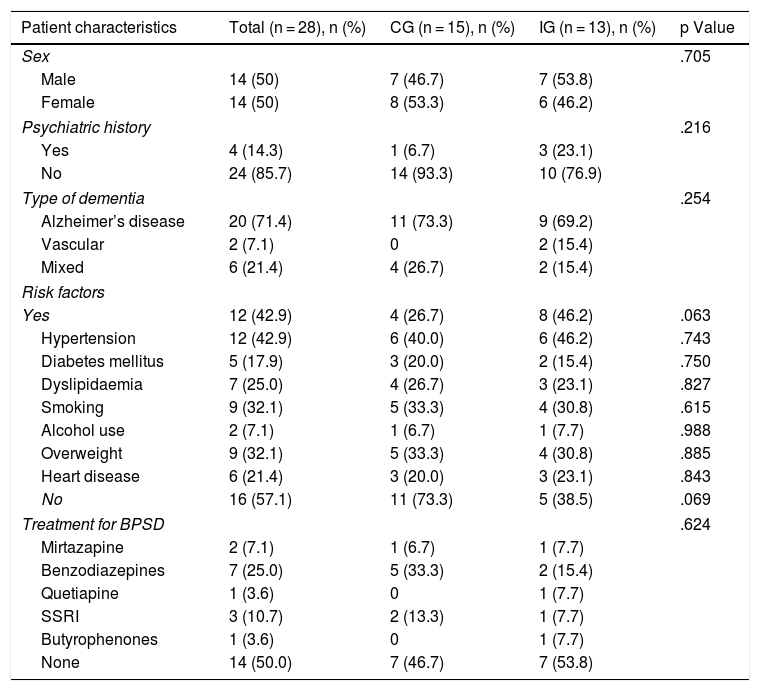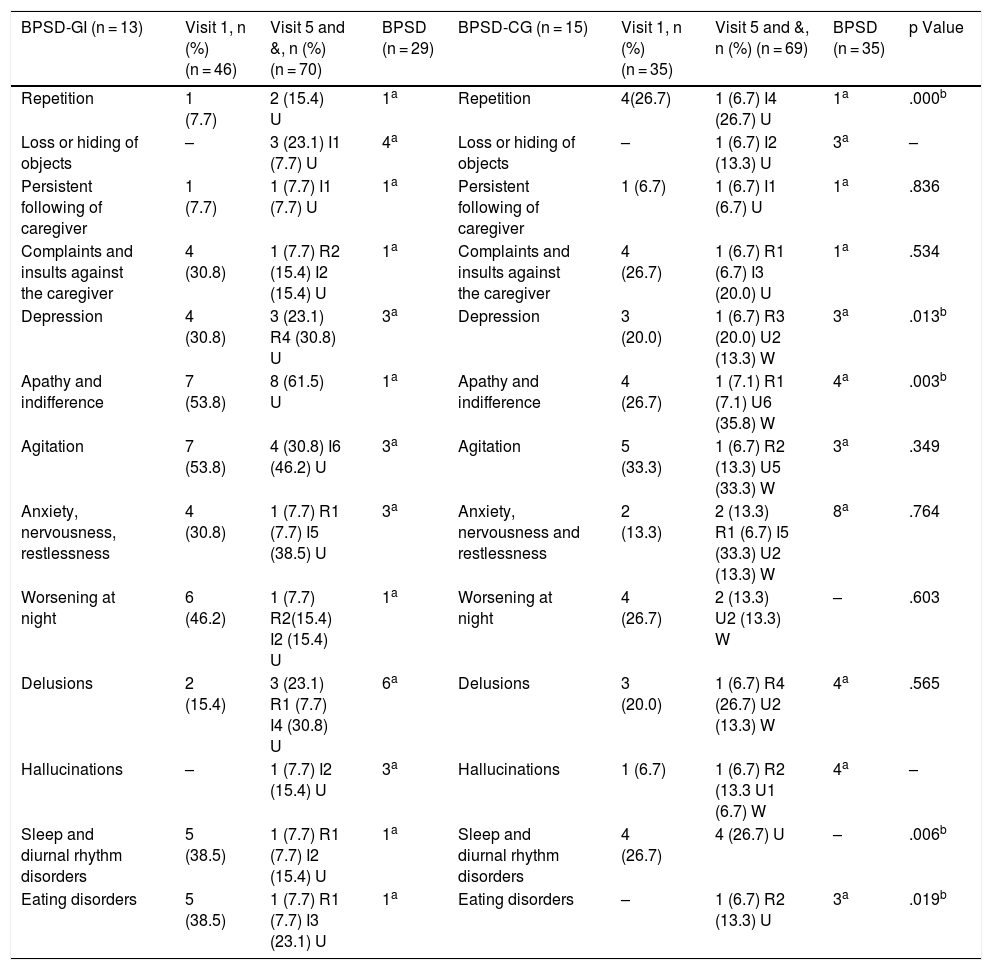The behavioral and psychological symptoms of dementia (BPSD) frequently appear associated with patients with dementia, aggravating their cognitive and behavioral status, which generates anguish for their main caregivers. Non-pharmacological therapies are a method to approach BPSD.
AimTo analyze the effectiveness of a behavioral educational intervention and support to the family caregiver on the reduction of its overload, and if this reduction has a positive impact on BPSD of the patient with dementia.
MethodsA randomized, controlled, double-blind trial was conducted with patients with dementia and their principal caregivers (PC). The PC were randomized to the intervention group (IG) or control (CG). The intervention consisted an individual cognitive-behavioral education performed by outpatient nursing, with periodic telephone contacts, during 3 months. CG received treatment as usual. Cognitive function was assessed using the cognitive scale Mini-Mental State Exploration (MMSE), Neuropsychiatric inventory (NPI-10) and depressive Geriatric Depression Scale (GDS). And caregiver reported burden through (Zarit Caregiver Burden Inventory). The Quantitative and qualitative data of SPCD’s were collected at baseline and after the intervention.
ResultsThe mean total age of patients was 78.96 (± 6.64) years and 50% were men. And in PC (n = 28) of 58.64 (± 11.69) years, and 92.9% were women. The IG (n = 13) showed better score than the CG (n = 15) in the MMSE p < 0,001 and the GDS p < 0,001, although without changes in the NPI-10 (p = 0,419), between the start visit and at 3 months, indicating improvement cognitive and depressive after the intervention. The PC also obtained statistically significant scores in the Zarit (p = 0,010). SPCD’s improved significantly in GI: repetition p < 0,001, depression (p = 0,013), apathy and indifference (p = 0,003), sleep and diurnal rhythm disorders (p = 0,006) and eating disorders (p = 0,019) at 3 months. Clinicaltrials.gov Identifier: NCT03732521.
ConclusionsThe non-pharmacological therapy of individual therapeutic-cognitive intervention directed to caregivers and carried out by nursing personnel expert in its management, has a favorable impact in the control and reduction of the SPCD of patients with dementia.
Los síntomas psicológicos y conductuales de las demencias (SPCD) aparecen con frecuencia asociados a los pacientes con demencia, agravando su estado cognitivo y conductual, que genera angustia a sus cuidadores principales. Las terapias no farmacológicas, son un método para abordar los SPCD.
ObjetivoAnalizar la eficacia de una intervención terapéutica-conductual y de apoyo al cuidador familiar sobre la reducción de su sobrecarga, y si dicha reducción tiene un impacto positivo sobre los SPCD del paciente con demencia.
MétodoEnsayo clínico, randomizado, doble ciego e una muestra de pacientes con demencia y sus cuidadores principales (CP). Los CP fueron asignados a un grupo de intervención (GI) y control (GC). La intervención consistió en una educación cognitiva-conductual individual realizada por enfermería ambulatoria, con controles periódicos telefónicos durante 3 meses. El GC recibió la atención de práctica clínica habitual. Fue evaluada la función cognitiva: escala Mini-Mental (MMSE), y Neuropsychiatric inventory (NPI-10), la depresiva: escala depresión Geriátrica (GDS) y sobrecarga del cuidador: escala Zarit. Los SPCD fueron recogidos según datos cuantitativos y cualitativos en la visita inicial y final.
ResultadosEdad media total de pacientes 78,96 (±6,64) años y distribución por sexos (50%) hombres. Los CP (n = 28), mostró una edad media de 58,64 (±11,69) años, siendo la práctica totalidad (92.9%) mujeres. El GI (n = 13) mostró mejor puntuación que el GC (n = 15) entre visitas (inicial y 3 meses), tanto en el MMSE p < 0,001 como en la GDS p < 0,001, aunque sin cambios en la NPI-10 (p = 0,419), indicando mejoría cognitiva y depresiva tras la intervención. Los cuidadores también obtuvieron puntuaciones estadísticamente significativas en el Zarit (p = 0,010). Los SPCD mejoraron en el GI: repetición p < 0,001, depresión (p = 0,013), apatía e indiferencia (p = 0,003), trastornos del sueño y del ritmo diurno (p = 0,006) y trastornos de la alimentación (p = 0,019) a los 3 meses. Identificador Clinicaltrial.gov: NCT03732521.
ConclusionesLa terapia no farmacológica de intervención terapéutica-cognitiva individual dirigida a cuidadores y conducida por personal de enfermería experto en su manejo, tiene un impacto favorable en el control y reducción de los SPCD de los pacientes con demencia.
Article
Diríjase al área privada de socios de la web de la SEDENE, (https://sedene.com/revista-de-sedene/ ) y autentifíquese.









